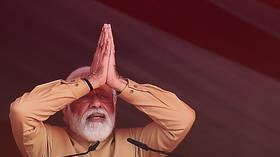India’s amended IT rules raise self-censorship fear for media outlets

India’s federal Ministry Ministry of Electronics and IT (MeitY) has notified amendments to the Information Technology (Intermediary Guidelines and Digital Media Ethics Code) Amendment Rules, 2023, which were initially proposed last June.
The revised norms have elicited angry responses from news organizations, who have expressed fears that the move is yet another bid to “muzzle the media.”
The administration of Narendra Modi, like its counterparts across the globe, is grappling with the raging issue of regulating social media intermediaries (SMIs).
In light of the emergent challenges because of the constant technological innovations that impact governance, the Modi government has introduced the Information Technology (Intermediary Guidelines and Digital Media Ethics Code) Rules, 2021 (IT Rules, 2021), which replaced its decade-old regulations on SMI.
The government insists that compliance with the amended rules is mandatory to “ensure an open, safe and trusted internet.”
According to the Indian government, the amendments have three well-defined objectives.
First, netizens’ constitutional rights and interests should not be contravened by big tech platforms such as Google, Meta, Twitter etc.
Second, they seek to further strengthen the grievance redressal framework in the rules.
Third, compliance with these norms does not relate to early stage start-ups.
The rules stipulate that SMIs must inform their users of the “host, display, upload, publish, transmit, store, update or share any information in respect to any business of the Indian government that is identified as fake or false or misleading by such fact-check unit” that governs these platforms.
There must be full disclosure regarding the categories of content that users are barred from hosting, displaying, sharing etc. on these platforms. SMIs are tasked with “making reasonable efforts” to prevent prohibited content being hosted on their platform by the users.
The platforms have taken exception to the subjective nature of the norms.
For instance, the SMIs have been given no clarity about the extent to which they can monitor and moderate content on their platforms. Similarly, users are apprehensive that empowering SMIs could lead to curbs on their freedom of speech and expression. For all SMIs, a grievance officer will be mandated who is to acknowledge the receipt of a complaint within 24 hours and dispose of it within 15 days.
The government plans to set up a fact-checking unit, which will screen all digital content under the revised standards. The unit will consist of two representatives from India’s federal Information Technology (IT) and Statistics Ministry, along with a media expert and a legal expert.
Initial reports suggested the unit would be the Press Information Bureau’s (PIB) fact-checking unit. However, later Rajeev Chandrasekhar, India’s Minister of State, MeitY, issued a clarification, assuring news organizations that the revised norms would only apply to SMIs.
But critics of the new rules are not buying the government’s arguments. Apar Gupta, a lawyer and the non-executive director of the Internet Freedom Foundation, a New Delhi-based non-profit for digital and civil rights, has questioned what the government considers “fake or false or misleading”.
The Editors Guild, which was founded in 1978 by the country’s veteran journalists to uphold freedom of the press and fundamental rights enshrined by the constitution of India, noted a day after the government’s notification that “what is further surprising is that the ministry (MeitY) has notified this amendment without any meaningful consultation that it had promised.”
The news organizations too, echoed, the Editors Guild. They are worried that the government’s diktat that those who do not comply with the new norms will lose their “safe harbor” protection in India amid a fresh bid to regulate online gaming.
The amended rules have led to legal wrangling as well.
The Bombay High Court has directed the government to file a response by April 19 regarding the new rules, seeking explanation about the reasons behind their implementation.
Earlier in February, opponents to the rule submitted a petition to the government. The plea cited that the proposed revised norms were in gross violation of the Shreya Singhal vs Union of India ruling by the Supreme Court in 2013.
However, the plea fell on the government’s deaf ears and it went ahead with the notification of the amended rules on April 6.














